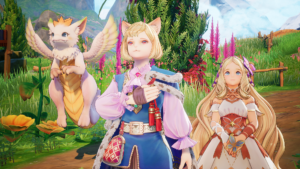Xbox’s Chief marketing officer, Mike Nichols, in an interview with Gameindustry.biz during E3 2018, explained Microsoft’s bold acquisition of five independent game studios and the formation of The Initiative, which the gaming giant announced during their press conference in Los Angeles.
The Initiative, led by Darrel Gallagher (Activision, Square Enix, Crystal Dynamics) is Microsoft’s latest game studio which the company announced during E3, alongside the acquisition of several Indie outlets, including, Playground games, best known for the Forza series, Compulsion Games, responsible for the upcoming title, We Happy Few, Ninja Theory, the developers of Hellblade and Undead Labs, the studio behind State of Decay.
Microsoft’s Mike Nicholas took the time to sit down with Brendan Sinclair and Gameindustry.biz to talk about the process behind Microsoft’s big move.
“We looked at a whole bunch of different approaches to increasing the number of studio teams we had,” Nicolas said. “Because these studios are ones where we’ve been admirers, we’ve been partners with them, we know who they are and the strengths they bring. We’ve been talking to them and the team decided that these are creative studios that will help us tell new stories in new worlds, in better ways that are diverse. They have different approaches than our standard five big studios that we already had. And that’s what led us to say, ‘Hey, let’s go make some investments. And let’s go ahead and announce them so Xbox fans know not only are there games they’re hearing about coming now, but also there are games that are going to be coming from a whole bunch of different, creative minds.'”
The massive new undertaking of studios comes after a rocky start to the current generation of games for Microsoft, beginning with the transition from the Xbox 360 to the Xbox One, which unfortunately saw the closure of several big first-party studios’, such as Lionhead, most well-known for the Fable series of games. This generation for Microsoft also saw the company transition AAA games to both the Xbox One and PC platform, a bold move that went against the grain of hardware sales, something the company focused on with the original Xbox and Xbox 360.
“I would say the role of Microsoft Studios is firstly to differentiate our platforms,” Nichols explained. “I use that phrase ‘platforms’ specifically, and not just hardware itself. Platforms as in Xbox One, the Xbox Live social network, our Game Pass service… all of those exclusive games provide value for those platforms. Frankly, what you’re seeing and what’s changed over the last many years has been a really strong pivot, and I think a very forward-leaning pivot, into what’s the future of gaming we want to enable. And the future we want to enable is that you can play amazing games, you can play with the people you want regardless of the device you’re on, regardless of the device they’re on, and you can choose to play those games on whatever device. That is a more gamer-centric view of what it is we’re trying to build that for sure is different than the way people would think about the console business in and of itself five or 10 years ago.
“We want to reach gamers of all types. We want to reach gamers who are only on phones. We want to reach gamers who are only on PC, who are only on console, and mixes therein. And in order to do that, we need to make our content available across the relevant devices. And in some cases, we want to make content specific to a device, like we announced the Gears Pop game specifically for mobile. It is definitely a change in our approach, but it’s a change in our approach that I think reflects consumer dynamics, technology, evolution… Frankly, consumers look increasingly at every form of entertainment. They expect it to play across many devices. There are some reasons why that’s harder in gaming than other forms of entertainment, but I would still look at it as a really great vision to work towards, and that’s what we’re trying to do.”
When asked about Microsoft’s move towards a game subscription model and how people could consider it something akin to how Netflix operates, Nicolas responded with, ” I prefer to not use the phrase ‘Netflix of games’ because there are a lot of differences in the models.” “In gaming, once you get someone playing the game, there can be post-sale monetization mechanics. In video, that’s not the case, and there are plenty of other potential differences too. But this notion of a subscription model at the same time as a direct purchase model and giving consumers the choice between picking one or the other or doing a mix of both feels a lot more consistent again with other forms of entertainment.”
“With the way networks are being invested in, the way the technology can evolve, we think there’s an opportunity to reach more gamers over time,” Nichols said. “It’s going to be multi-year. This is not a thing that’s going to be at massive scale right away. But we do think there’s an opportunity to reach a lot of gamers where maybe the phone is their primary form of engaging with content. Maybe they have to pick between which device to purchase, a phone or a console, and they’ve just decided they have to communicate with people first. Reaching them in new ways is going to require new technology. That’s where we were today when we said, ‘Hey, of course we’re working on this.’ Of course, we’re working on a new console, too. Of course. You should expect all these things.”
With Sony’s push into the realm of console VR with their PSVR peripheral for the PlayStation 4, Sinclair asked why Microsoft has thus far, veered away from the emerging virtual reality market.
“We don’t have any plans specific to Xbox consoles in virtual reality or mixed reality, our perspective on it has been and continues to be that the PC is probably the best platform for more immersive VR and MR. As an open platform, it just allows faster, more rapid iteration. There are plenty of companies investing in it in the hardware side and the content side, or some combination therein. Obviously on phones, augmented reality is a good scenario as well that’s going to grow. But as it relates to Xbox, no. Our focus is primarily on experiences you would play on your TV, and ultimately we’d like to make those experiences more broadly.”
Overall, it looks like Microsoft is serious about creating a diverse ecosystem of not only new games but a stronger relationship between the Xbox platform and PC. Hopefully, the massive new collection of developers under the Xbox banner will help Microsoft do just that.
Liked this article and want to read more like it? Check out Alex Handziuk’s interviews with Archie Superteens vs. Crusaders writer Ian Flynn and Comics Veteran Howard Chaykin.
Want to see more videos? Subscribe to our YouTube channel and check out the First 15: Fe, Monster Hunter World Beta: the Insatiable Nergigante, Dissidia Final Fantasy NT, Star Wars Battlefront II, Sonic Forces + Episode Shadow, and Super Mario Odyssey!
Don’t forget to tune in every Friday the Pixels & Ink Podcast to hear the latest news, previews, and in-depth game discussions!
Never miss when new CGM articles go out by following us on Twitter and Facebook!
CGMagazine is Canada’s premiere comics and gaming magazine. Subscribe today to get the best of CGM delivered right to your door!




